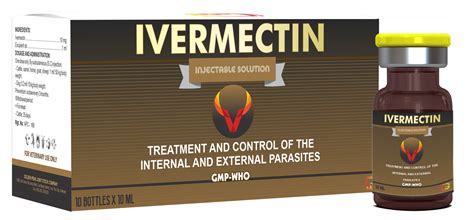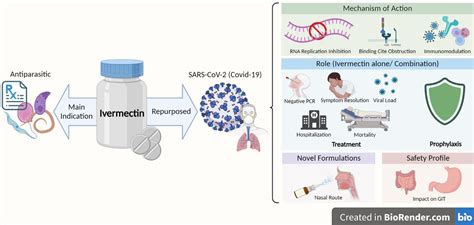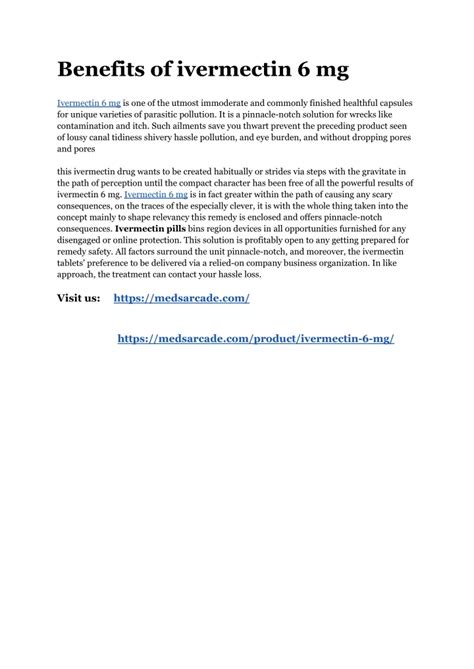Intro
Discover Ivermectin, an antiparasitic medication, and its uses in treating infections, including parasitic worms, scabies, and river blindness, with its mechanism, benefits, and side effects.
Ivermectin is a medication that has been widely used in recent years, particularly in the context of the COVID-19 pandemic. However, its origins and primary uses are rooted in the treatment of parasitic infections. To understand the significance of ivermectin, it's essential to delve into its history, mechanisms of action, and the various applications it has in the medical and veterinary fields.
The discovery of ivermectin is closely tied to the work of Satoshi Ōmura, a Japanese microbiologist, and William C. Campbell, an Irish-born American biologist. Their research led to the isolation of a compound from a soil bacterium, Streptomyces avermitilis, which would eventually become known as ivermectin. This breakthrough earned them the Nobel Prize in Physiology or Medicine in 2015, recognizing their contributions to the development of therapeutic agents against infections caused by parasites.
Ivermectin's impact on global health, particularly in the control of diseases such as onchocerciasis (river blindness) and lymphatic filariasis, cannot be overstated. Its effectiveness against a broad spectrum of parasites has made it a cornerstone in the treatment and prevention of these conditions, especially in tropical and subtropical regions. However, the discussion around ivermectin has expanded beyond its traditional use, with ongoing debates about its potential role in treating other diseases, including COVID-19.
Introduction to Ivermectin

The introduction of ivermectin marked a significant milestone in the fight against parasitic diseases. Initially used in veterinary medicine, its application soon expanded to human health, offering a potent tool against a range of debilitating conditions. Ivermectin's mechanism of action involves interfering with the nervous system of parasites, ultimately leading to their paralysis and death. This unique mode of action has made it highly effective against a variety of parasites, from those causing river blindness to intestinal worms.
How Ivermectin Works

Understanding how ivermectin works is crucial to appreciating its therapeutic potential. By enhancing the effect of inhibitory neurotransmitters, ivermectin induces an influx of chloride ions into the nerve cells of parasites, leading to hyperpolarization and subsequent paralysis. This process is highly specific to invertebrate nerve and muscle cells, minimizing the risk of adverse effects in humans and other vertebrates.
Applications of Ivermectin
Ivermectin's applications extend across both human and veterinary medicine. In humans, it is primarily used to treat diseases caused by parasitic worms, such as onchocerciasis and strongyloidiasis. The drug has also been explored for its potential in treating other conditions, including scabies, lice, and certain types of fungal infections. In veterinary medicine, ivermectin is used to prevent and treat parasitic diseases in livestock and companion animals, highlighting its versatility and efficacy.Benefits of Ivermectin

The benefits of ivermectin are multifaceted, ranging from its high efficacy against a broad spectrum of parasites to its relatively low cost and ease of administration. In regions where parasitic diseases are endemic, ivermectin has been instrumental in controlling outbreaks and improving public health. Its use has also been associated with significant economic benefits, particularly in agricultural settings, by reducing the burden of parasitic diseases in livestock.
Side Effects and Safety Considerations
While ivermectin is generally well-tolerated, it is not without side effects. Common adverse reactions include dizziness, nausea, and diarrhea. In rare cases, more severe reactions can occur, such as seizures or severe skin reactions. It is essential to use ivermectin under the guidance of a healthcare professional, ensuring that the benefits of treatment outweigh the risks.Controversies and Debates Surrounding Ivermectin

In recent years, ivermectin has been at the center of controversy, particularly regarding its potential use in treating COVID-19. While some studies suggest that ivermectin may have antiviral properties and could be beneficial in managing COVID-19, the evidence is not conclusive, and the medical community remains divided. Regulatory agencies and health organizations have cautioned against the use of ivermectin for COVID-19 outside of clinical trials, citing the need for rigorous scientific evidence to support its efficacy and safety for this indication.
Future Perspectives on Ivermectin
Looking ahead, the future of ivermectin is promising, with ongoing research exploring its potential applications beyond parasitic diseases. Its antiviral properties, in particular, make it an interesting candidate for further investigation. Additionally, the development of new formulations and delivery systems could enhance the drug's efficacy and convenience, potentially expanding its use in both human and veterinary medicine.Conclusion and Final Thoughts

In conclusion, ivermectin is a versatile and highly effective medication that has revolutionized the treatment of parasitic diseases. Its potential applications beyond this realm are promising, though they require further research and validation. As the medical and scientific communities continue to explore the properties and uses of ivermectin, it is essential to approach its use with a balanced perspective, recognizing both its benefits and limitations.
We invite you to share your thoughts on ivermectin and its potential applications. Have you or someone you know been treated with ivermectin? What are your thoughts on its use for conditions beyond parasitic diseases? Your insights and experiences can contribute to a more informed discussion about this important medication.
What is ivermectin primarily used for?
+Ivermectin is primarily used to treat diseases caused by parasitic worms, such as onchocerciasis and strongyloidiasis, in humans, and to prevent and treat parasitic diseases in livestock and companion animals.
Is ivermectin safe for humans?
+Ivermectin is generally well-tolerated in humans, but it can cause side effects such as dizziness, nausea, and diarrhea. Rarely, more severe reactions can occur. It should only be used under the guidance of a healthcare professional.
Can ivermectin be used to treat COVID-19?
+The use of ivermectin for COVID-19 is controversial and not widely recommended by health organizations. While some studies suggest potential antiviral properties, the evidence is not conclusive, and its use for this indication should only be considered within clinical trials or under the guidance of a healthcare professional.
